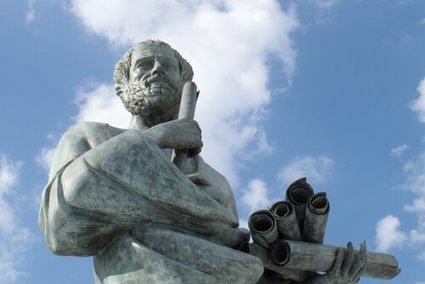Nous essayons d’être persuasifs lorsque nous présentons des arguments, qu’ils soient oraux ou écrits. Le public doit comprendre notre point de vue, avant même d’accepter nos arguments. Voilà en quoi consiste la rhétorique, dans laquelle les autres adoptent notre point de vue. Et qui de mieux qu’Aristote pour expliquer la rhétorique ? Les études de l’élève de Platon se sont concentrées sur la rhétorique. Ainsi, la rhétorique d’Aristote se compose de trois catégories : le pathos, l’éthos et le logos.
Le pathos, l’ethos et le logos sont les trois piliers fondamentaux de la rhétorique d’Aristote. Ces trois catégories sont considérées aujourd’hui comme différentes façons de convaincre un auditoire sur un sujet, une croyance ou une conclusion en particulier. Chaque catégorie est différente des autres. Néanmoins, connaître les trois nous aidera à impliquer les publics que nous abordons.
Learn more / En savoir plus / Mehr erfahren:
http://www.scoop.it/t/21st-century-learning-and-teaching/?tag=Irony
http://www.scoop.it/t/21st-century-learning-and-teaching/?tag=Rhetorik



 Your new post is loading...
Your new post is loading...













Nous essayons d’être persuasifs lorsque nous présentons des arguments, qu’ils soient oraux ou écrits. Le public doit comprendre notre point de vue, avant même d’accepter nos arguments. Voilà en quoi consiste la rhétorique, dans laquelle les autres adoptent notre point de vue. Et qui de mieux qu’Aristote pour expliquer la rhétorique ? Les études de l’élève de Platon se sont concentrées sur la rhétorique. Ainsi, la rhétorique d’Aristote se compose de trois catégories : le pathos, l’éthos et le logos.
Le pathos, l’ethos et le logos sont les trois piliers fondamentaux de la rhétorique d’Aristote. Ces trois catégories sont considérées aujourd’hui comme différentes façons de convaincre un auditoire sur un sujet, une croyance ou une conclusion en particulier. Chaque catégorie est différente des autres. Néanmoins, connaître les trois nous aidera à impliquer les publics que nous abordons.
Learn more / En savoir plus / Mehr erfahren:
http://www.scoop.it/t/21st-century-learning-and-teaching/?tag=Irony
http://www.scoop.it/t/21st-century-learning-and-teaching/?tag=Rhetorik